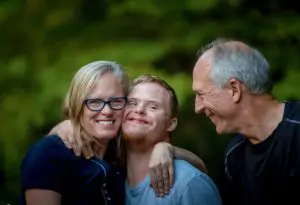In most cases Behavioral Assessments are the beginning point of entry (the first step in developing behavioral support strategies for the individual in need). These comprehensive assessments are conducted by trained clinical professional staff, typically a licensed psychologist., a psychology associate under the supervision of a licensed psychologist, a licensed professional counselor, a licensed certified social worker, a licensed behavioral analyst or a licensed physician (all of whom are required by COMAR to have training and experience in applied behavior analysis- usually referred to as ABA). This comprehensive assessment will always include a functional assessment/functional analysis of the problem behavior(s) in the individual’s primary environments (i.e. home, work, school etc.) as well as an environmental assessment(s), direct observation (including an ABC analysis), record review, development of specific behavioral objectives (including a data base) and hypotheses for each problem behavior. A comprehensive written report will always be generated for the caregiver and/or provider. The behavior assessment will conclude with a recommendation for one of the following tiers of behavioral support:
- Tier 1 (positive interactions, choice making, predictable/proactive setting/environment);
- Tier 2 (social, communication, emotional, physiological intervention/therapy; or
- Tier 3 (individual behavior plan)
Behavioral Consultation primarily involves the development of Tier 1, Tier 2, and Tier 3 behavioral intervention strategies working in conjunction with the interdisciplinary team. This may involve collaboration with other treatment professionals as well as family members. The next steps are training (family and staff) on the implementation of the strategies, development of data collection procedures, as well as monitoring, review and data based evaluation.
Behavioral Support is provided typically by behavioral technicians as a follow-up activity, complimenting and ensuring that strategies and recommendations are being implemented consistently/correctly and that expected behavioral outcomes are being achieved. Although there is considerable variability in the design and delivery of Behavioral Support, due to variances in the support needs of the person involved, Behavioral Support typically involves:
- On-site execution and modeling of identified Behavior support strategies;
- Direct support and follow up to the caregiver or provider to ensure that recommendations and strategies are being implemented in a manner that is consistent with the Person-Centered Tiered Support Plan;
- Timely semi-structured written feedback to the clinicians on the provision and effectiveness of the Person Centered Tiered Support Plan and strategies; and
- Participation in on-site meetings or instructional sessions with the individual’s support network regarding the recommendations, strategies, and next steps identified in the Person Centered Tiered Support Plan.
This partnership brings together Humanim, The Arc Southern Maryland, The Arc of Washington County, and Somerset Community Services for the purpose of providing comprehensive Statewide Behavioral Support Services to Maryland residents with intellectual and developmental disabilities. This partnership contains Mobile Crisis Intervention Services and Behavioral respite.
Mobile Crisis Intervention Services (MCIS)
The Mobile Crisis Intervention Team is available 24/7/365 Statewide to respond to a behavioral emergency that may result or has resulted in a harmful or potentially harmful outcome to a person who has been found eligible for DDA services or who is reasonable presumed to be eligible for DDA services. The goal for these services is to reduce harm to self or others, emergency hospital admission, and/or potential police/legal involvement.
Access to MCIS:
All calls for the Mobile Crisis Intervention Team should go through our 24/7 call center at (1-888-374-3276) and will be answered by a trained crisis intervention staff.
Behavioral Respite
Behavioral Respite is a highly structured intervention that provides intensive behavioral services in a well-controlled, behaviorally managed residential environment. The primary purpose of Behavioral Respite Service is to reduce the frequency, intensity, and duration of challenging behaviors and/or manage co-occurring mental health issues so that the individual with IDD is able to return to a community-based placement either through a DDA provider or family/caretaker.
Behavioral Respite can be used to meet the needs of a person for substitute care and supervision in emergency situations or as a planned, coordinated, transitional step-down program from acute care psychiatric facility.
Behavioral Respite typically occurs following a series of serious behavioral incidents or a severe behavioral outburst where an assessment has been made that changing the person’s environment is part of the therapeutic intervention needed to improve the situation. This is a temporary, time-limited placement that is prepared to meet these needs.
All respite settings will have appropriate licensing and/or approval from DDA. Utilizing the statewide network of respite beds, children will be accommodated as well as adults. Children will be accommodated in a separate location.
Access to this service is contingent upon referral/authorization from the appropriate DDA Regional Office. Respite services for a person shall not exceed 45 calendar days within a one year period and shall not be provided for more than 28 consecutive calendar days unless prior approval in granted by DDA.




